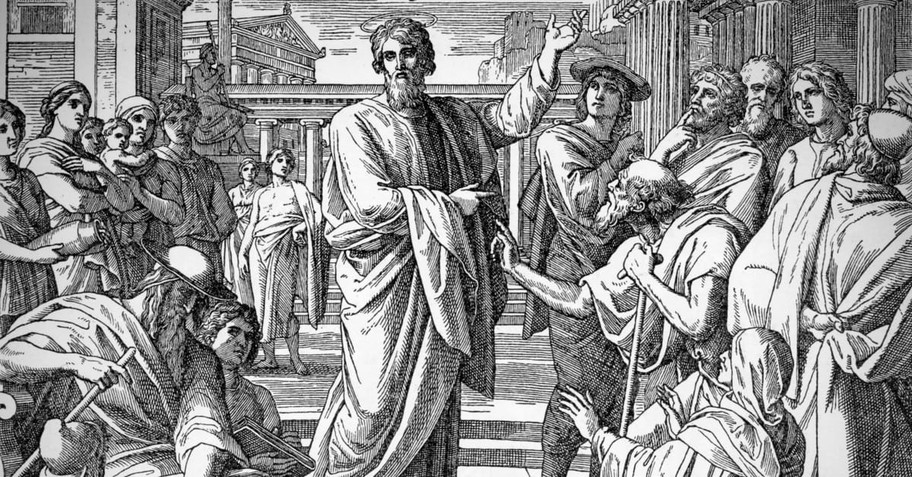What Does it Mean that the Bible Was "Inspired?"

Last week we began a bibliology series looking at some of the most critical and fundamental questions surrounding the Bible. What is the Bible? Where did we get it? Who decided what would, and would not be, in the Bible? How can it be said that the 66 books alone are the inerrant, infallible words of God?
These questions concern the topic of bibliology. We are attempting to address these over the course of the next several weeks. Last week, we studied the topic of revelation, answering the question, “What is the Bible?”
In today’s post, we will go further and attempt to answer the questions, “How did God give special revelation?” “Where did the Bible come from?” “How did we actually get these written words on the page?”
You get many different answers to the question, “Where did the Bible come from?”
“From some guys at religious councils several hundred years ago.”
“From the minds of devious, manipulative men.”
“From the hearts of very moved individuals with profound writing skills.”
It’s a question that God’s people must be able to answer.
Now, we will begin with this assertion, which will be supported by the end of this series: the 66 books of the Bible are verbally inspired in every word, absolutely inerrant in the original documents, infallible, and God breathed.
But we have a problem. The Bible speaks unapologetically about the universal sinfulness of men. And men were used to record the Bible. So, how could imperfect humans record God’s perfect revelation? God understood the issue and acted accordingly in inspiration.
Photo Courtesy: Thinkstock

What is inspiration?
Inspiration explains how flawed men could record flawless holy Scripture. By inspiration, however, we do not mean something subjective. The biblical doctrine of inspiration does not mean inspiration in the sense that Mozart was inspired when he wrote Eine Kleine Nachtmusik. Inspiration does not mean that the biblical writers felt a subjective enthusiasm or stir, such that the Bible came to be. It does not mean that Scripture is merely the product of significant human achievement. Neither is biblical inspiration existential; the idea that the words of the Bible become inspired as the reader interacts with them.
Instead, inspiration means this: God the Holy Spirit superintended the human writers of the 66 books of the Bible such that what they wrote were God’s inerrant words to humanity in the original writings. In doing so, God did not violate the respective personalities, abilities, and contexts of the human authors from which they wrote. God acted upon them in a real context, with real need, to exercise his care for his people, with the result that the 66 books of the Bible are the without-error revelation of God in their original writings.
This means that to read the words of the Bible is to read the words of God. To study the Bible is to study the words of God. To pay attention to the Bible is to pay attention to God. To obey the Bible is to obey God. To speak the Bible is to speak the words of God. God gave his words through the act of inspiration with the result that the 66 books of the Bible are the very words of God in entirety.
Photo Courtesy: Pexels
.1200w.tn.jpg)
The Biblical Testimony to Inspiration
God testifies to inspiration in Scripture. For example, 2 Timothy 3:16 teaches that, “All Scripture is inspired by God.” The English phrase, “is inspired by God,” translates the Greek term, θεόπνευστος, which literally means, “God-breathed.” The verb is passive, meaning that something else did the acting. Specifically, that Scripture is God-breathed tells us two key facts about the Bible. First, it tells us the how: the Bible came about through the breathing, or, speaking of God. Second, it tells us the what: the Bible is divine in its origin; all of it is from God.
But there’s more. The Greek word, graphe, translated, “Scripture,” occurs 51 times in the New Testament and usually refers to the Old Testament Scriptures. That takes care of the first 39 books of the Bible, but what about the other 27? In 1 Timothy 5:18 and 2 Peter 3:16, graphe includes New Testament writings as well. In 1 Timothy 5:18, Paul writes, “For the Scripture says, ‘You shall not muzzle the ox while he is threshing,’ and, ‘The laborer is worthy of his wages.’” Here, Paul quotes both from the Old and New Testaments (Deut. 25:4 and Matt. 10:10). So, Paul puts New Testament Scripture on par with the Old. Peter does the same. In 2 Pet 3:15-16, he writes:
…just as also our beloved brother Paul, according to the wisdom given him, wrote to you, as also in all his letters, speaking in them of these things, in which are some things hard to understand, which the untaught and unstable distort, as they do also the rest of the Scriptures, to their own destruction.
Peter says that Paul’s writings are considered “Scripture” along with the Old Testament. Thus, both the Old and New Testament books are categorically “Scripture.” As such, they are, “God-breathed” (2 Tim. 3:16). And, everything that belongs to the category of Scripture is inherently “God-breathed.” This is massive, for it means that “God-breathed” is the fundamental attribute of Scripture.
Photo Courtesy: Lightstock

The Process of Inspiration
That takes care of the quality of Scripture. But what about the process of inspiration itself? How did that work? How did the God-breathed Scripture come about?
Second Peter 1:20–21 tells us: “But know this first of all, that no prophecy of Scripture is a matter of one’s own interpretation, for no prophecy was ever made by an act of human will, but men moved by the Holy Spirit spoke from God.”
In this text, Peter teaches that his message is reliable not because of him, but because of who the message is from. He writes, “No prophecy of Scripture is a matter one’s own interpretation…” The word translated, “prophecy,” refers to Scripture. And, the word, “interpretation,” is not referring to one’s subjective understanding, but the origin; an author who is delivering the text to the reader from God to the original audience. In other words, the origin of Scripture is not first from the mind of human authors. Human authors did not write what they hunched God might want to get across. Instead, it means that the prophetic content—Scripture—is God speaking his words.
The process happened as, “…men moved by the Holy Spirit spoke from God.” The Greek word translated, “moved,” is the same word used in Acts 27:15 where Luke writes of a ship being carried along. The idea, then, of 2 Peter 1:21, is that God’s chosen writers wrote as they were carried along. How did God transmit the Scripture? Sometimes it was dictation from God, but often it was not. Speaking to inspiration of New Testament content, Jesus told the apostles, “But the Helper, the Holy Spirit, whom the Father will send in My name, He will teach you all things, and bring to your remembrance all that I said to you” (John 14:26). This answers the question of how the human authors could recall what they did: the Spirit carried them along. Overall, we must say that there is an element of mystery to the particulars of Scripture’s transmission. The larger point, however, is that while men were the instruments of the work, they spoke a direct word given by the Holy Spirit without violating either God’s intended words or the context and personality of the human instrument.
Photo Courtesy: Thinkstock

The Holy Spirit and Scripture
Finally, it was the Holy Spirit who played the most central role in giving us the word of God. He carried the fallible human authors along so that they recorded God’s infallible revelation. The Spirit, then, is inseparably bound to the 66 books of the Bible. For this reason, John Owen said “He that would utterly separate the Spirit from the word had as good burn his Bible” (The Works of John Owen, 3:192-3). John Calvin also appropriately observed, “We owe to the Scripture the same reverence which we owe to God; because it has proceeded from him alone, and has nothing belonging to man mixed with it” (Calvin’s Commentary, 2 Tim. 3:16). We also see the inseparable union of the Spirit to Scripture in parallel passages such as Ephesians 5:18 and Colossians 3:16, where Spirit-filling is synonymous to being Scripture-filled. In more recent days of church history, Christians often speak of a word or revelation from the Holy Spirit. And that’s good to desire such a thing. But we need look no farther than the 66 books of the Bible for all of the words, revelation, and hunches from the Holy Spirit. What a great God he is! The Spirit spoke and he has not left us without one of his words which is necessary for life and godliness.
Photo Courtesy: Thinkstock

Clarifications and Limits of Inspiration
The doctrine of inspiration does not mean that all other things that God’s human instruments thought or wrote on different occasions were inspired. In one sermon, Ezekiel might have recorded inerrant words of God. But during another, he might have laid an egg.
Second Timothy 3:16 says only that “Scripture” is “God-breathed.” It does not say that the writers themselves were God-breathed. So, it follows that it is better to think of the letters themselves as inspired, and not the human authors of the letters.
Photo Courtesy: Lightstock

Jesus and the Apostles on Inspiration
We can observe Jesus’ view of Scripture in several verses. He affirmed that Scripture is absolutely authoritative. “[A]nd he said to Him, ‘All these things I will give You, if You fall down and worship me.’ Then Jesus said to him, ‘Go, Satan! For it is written, ‘You shall worship the Lord your God and serve him only’” (Matt. 4:9-10, cf. vv. 4, 7).
He believed the historical truth of Old Testament miracles. “For the coming of the Son of Man will be just like the days of Noah. For as in those days before the flood they were eating and drinking, marrying and giving in marriage, until the day that Noah entered the ark” (Matt. 24:37-38).
Christ also refers to the historicity of events such as the burning bush, the destruction of Sodom, Manna in the wilderness, the healing of Naaman, and Jonah and the fish.
Jesus witnessed to the inspiration of the New Testament. He prophesied the completion of biblical revelation. “But when He, the Spirit of truth, comes, He will guide you into all the truth; for He will not speak on His own initiative, but whatever He hears, He will speak; and He will disclose to you what is to come” (John 16:13). He pre-authenticated the New Testament Scriptures. “But the Helper, the Holy Spirit, whom the Father will send in My name, He will teach you all things, and bring to remembrance all that I said to you” (John 14:26, cf. John 16:13a). The Holy Spirit guided the Apostles to provide the church with inspired truth.

The Apostles on Inspiration
The apostles witnessed to biblical inspiration. They appeal to the Old Testament as justification for their Gospel. “For I delivered to you first of all that which I also received: that Christ died for our sins according to the Scriptures, and that He was buried, and that He rose again the third day according to the Scriptures” (1 Cor. 15:3). Paul assumed that Christ’s death was in accordance with previously-written Scripture. The apostles also identified God with the Scriptures and vice versa. “For the Scripture says to Pharaoh, ‘For this very purpose I have raised you up, that I may show My power in you, and that My name may be declared in all the earth’” (Rom. 9:17). And, as mentioned, the apostles regarded other New Testament authors as writers of Scripture (2 Pet. 3:15). Finally, they regarded their own writings as from God (1 Thess. 2:13).
Photo Courtesy: Thinkstock

Is the Whole Bible Inspired?
With confusion about inspiration in more recent times, qualifiers become necessary. The word “plenary” is one of those. It means “full,” carrying the idea that all the words of Scripture are God’s words. Everything in Scripture is God’s word. One of the implications of this is that we are not in a position to pick and choose what is inspired and authoritative.
A second necessary qualifier when speaking of biblical inspiration is, “verbal.” It means that the very words of Scripture are God-breathed, not merely general concepts or subjective take-aways. So, this means that inspiration pertains to far more than the general message of Scripture, but also down to the individual words, even the letters. Inspiration includes the grammar and syntax of the text (i.e. mood, voice, verb tense, sentence structure). We see a wonderful example of this when Jesus argues for the doctrine of resurrection on the basis of the tense of the verb, “to be,” in Matthew 22:32.
Photo Courtesy: Thinkstock

Implications of Inspiration
We can observe a few implications of inspiration. There are several, but a few will be mentioned here. The church did not decide what should be in the Bible, but merely recognized the product of God-breathed inspiration. The act of inspiration by God the Holy Spirit was the act of God deciding what would constitute Scripture; the contents of the Bible. J.I. Packer wrote:
The church no more gave us the New Testament canon that Sir Isaac Newton gave us the force of gravity. God gave us gravity, by His work of creation, and similarly He gave us the New Testament canon, by inspiring the individual books that make it up (God Has Spoken: Revelation and the Bible, p. 81).
As mentioned, the Spirit of God cannot be separated from the word of God. His work of inspiration binds him to the word. Thus to say, for example, “Don’t elevate Scripture above the Holy Spirit,” is to make a boogeyman distinction. To elevate Scripture and God are one in the same act of worship.
Finally, inspiration has given us something to be used as the chief instrument of our salvation (Rom. 10:17), sanctification (John 17:17), and worship (Ps. 119:48). Inspiration has as its end all three of these. This must be the response of all to the inspired word of God.
Photo Courtesy: Thinkstock

Conclusion
God’s act of inspiration establishes the fact that the 66 books of the Bible are inerrant and infallible in every word. God makes no error in that which he inspires, regardless of the instrument. Further, since the Scriptures are inspired revelation from God, they are authoritative in all matters to which they speak. The consequence of inspiration is inerrancy and authority.
But what about the translation errors? And what is the extent of inerrancy—of the “without-error-ness” of the Bible? And how do we know? And how do we know which documents belong in the Bible? These issues will be addressed in the coming weeks of our bibliology series.
This article originally appeared on https://thecripplegate.com/. Used with permission.
Eric Davis is the pastor of Cornerstone Church in Jackson Hole, WY. He and his team planted the church in 2008. He has been married for 15 years and has 3 children.
Check out our article on How "Inerrant" is the Bible? for more information on Bible authorship.
Photo Courtesy: Lightstock
Originally published March 28, 2018.





